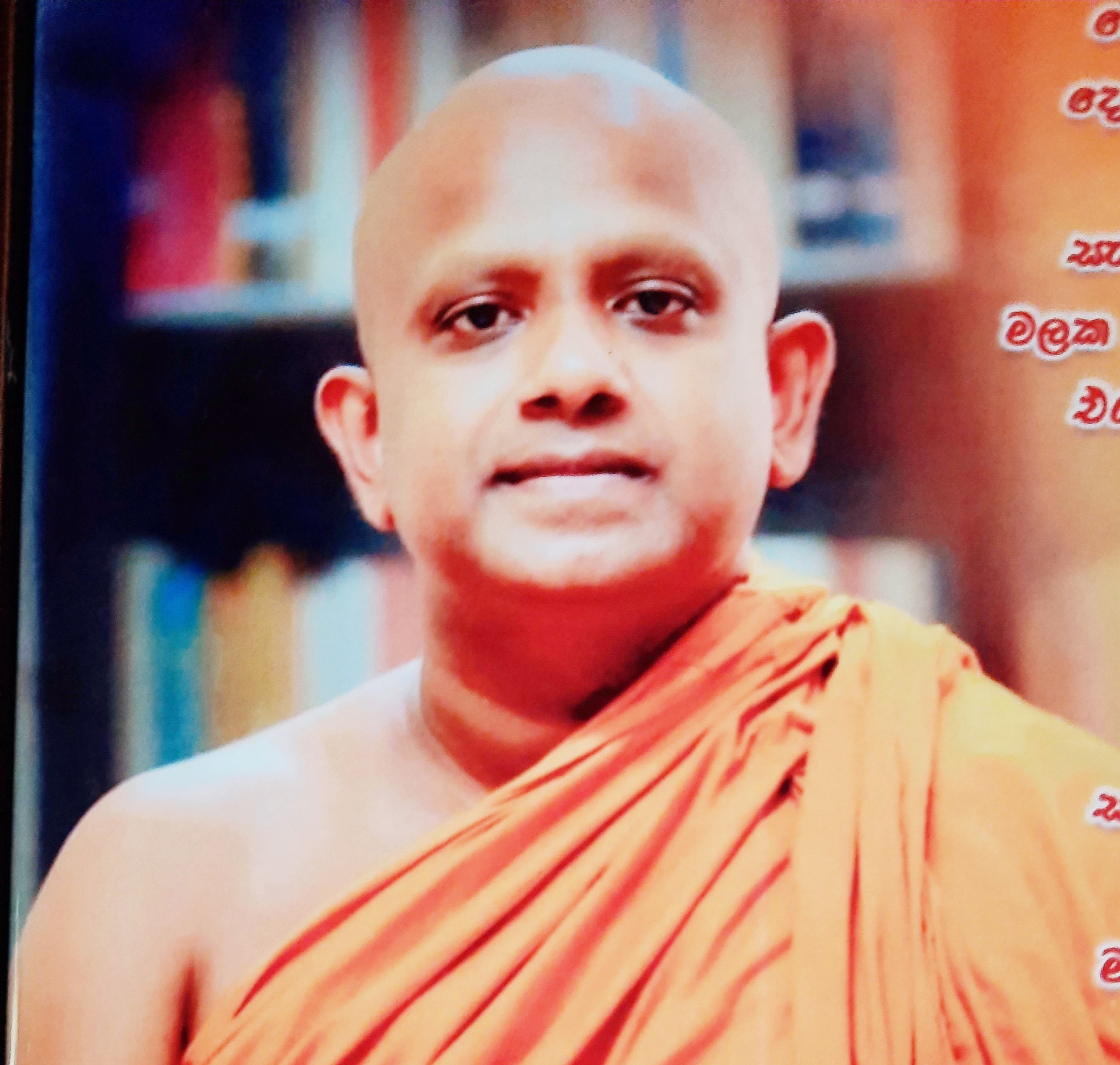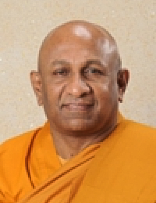仏教活動
慈しみ寺では当山会員及び参拝者へ、テーラワーダ仏教の伝統によって保存されている初期仏教の教えを学び実践する機会を提供しています
当山は葬儀を行わず、会員希望者のご供養をおこないます
僧侶
Ven.Deniyaye Paññāloka Buddharakkhita Bhante

1973 Born in Sri Lanka.
1986 Ordained as a novice monk.
1994 Received higher ordination
1996 Graduated, University of Kelaniya, Sri Lanka.
1997 Appointed as a lecturer, University of Kelaniya.
2006 Graduate researcher, Graduate school of Humanities, Kyushu University, Japan.
At Present :
A senior Lecturer in Department of Pali and Buddhist studies in University of Kelaniya Deputy Incumbent, Kelaniya Rajamaha Viharaya & Kitsirimevan Kelaniya Rajamaha Viharaya The principal of Sri Kalyani Dhamma School
現在:
ケラニア寺院副住職
スリランカ国立ケラニア大学講師
2012年慈しみ寺 副住職
2015年慈しみ寺 住職(第2代)
Most Ven. Professor Kollupitiye Mahinda Saṅgharakkhita Nāyaka Bhante

1953 Born in Sri Lanka.
1979 Postgraduate researcher, Sorbonne University, France.
1982 Postgraduate researcher, Delhi University, India.
1987 Ph.D., Delhi University, India.
1992 Appointed as the Chief Incumbent of the Kelaniya Rajamaha Viharaya.
2008 Appointed as the professor of Buddhist studies, University of Kelaniya, Sri Lanka.
At Present :
Professor, Buddhist Studies, University of Kelaniya, Sri Lanka
The Chief Incumbent, Kelaniya Rajamaha Viharaya & Kitsirimevan Kelaniya Rajamaha Viharaya
現在:
ケラニア大学元教授
ケラニア寺院総管長
2012年慈しみ寺 初代住職
2015年慈しみ寺 最高顧問
Book(著書)
「Gihi Vinaya, 1997」
「Budunwadala Caritaya, 1999」
「Sampindita Nidhanam, 2005」
「Parani Budusirita, 2006」
「Madyamaka Darshanayata Perawadanak, 2007」
「Gatika Bauddha Manavidyava, 2008
定期的活動
1)日常行事
お布施とお経会(朝、正午前、夕)
ブッダァ釈尊へのお布施(Buddhapūjā (Dhātupūjā and Bodhipūjā))
読経(朝夕のみ)Chanting (Teaching of all Buddhas, Mangalasutta, Ratanasutta,
Mettasutta, Aṭṭhavīsati Buddha Paritta, Sīvalī Paritta, Jayaparitta,Jinapañjara) [morning and evening only])
神々への廻向 Transferring merit to gods
供養(お亡くなりになり、次の生に向かわれた方々へ)Transferring merit to the dead and departed ones
僧侶へのお布施(朝正午前のみ)(Saṅghadāna – offering vegetarian meals to monks [morning and lunch only])
2)月間行事
ダァンマダーナ初期仏教学習実践会
(Session for study early Buddhism and Bhāvanā)
第4日曜日 9時30分~14時30分
(当日夕のお経会にご参加の場合は19時30分迄)
3)年間行事
5月 ウェーサカ祭り
Wesak Celebrations – Meritorious activities for the anniversaries of
the Buddha’s birth, Enlightenment and Entering into
Final Emancipation.
5月 開山法要(Anniversary of establishing Mettāvihāra)
7月 雨安居(Observing rainy retreat)
8月 広島平和祈念法要
(Hiroshima Atomic Bomb anniversary memorial meritorious deeds
for transferring merit to the dead and wish blessings for those
affected)
8月 お盆特別供養会
(Obon special meritorious day for the transferring merit to
the ancestors)
11月 カティナ袈裟法要
(Kaṭhina Robe offering ceremony at the end of the
rainy retreat.)
4)不定期的活動
瞑想会(3日間)
当山は葬儀は行わす、会員希望者のご供養を行います。
当山では葬儀は行わず、墓所もありません。会員ご逝去の際には各会員の家族伝統でご葬儀などを行っていただきます。
ブッダァ釈尊は、亡きご両親様、ご先祖のお供養は大切であると教えて下さいます。初期仏教では、ブッダァ釈尊が教えて下さった供養の方法が伝えられ、スリランカなどの初期仏教国では、親族が自宅へ僧侶をお招きし、あるいは親族が寺院を参拝して故人の供養を行っています。護教と呼ばれる経典を読経して生じる清らかな功徳を供養します。供養の作法は、功徳を供養するシンボルです。
供養は、自らの善行為によって生じた清らかな功徳のエネルギーを、お亡くなりになった方が次にお生まれになっている先で、供養に気づいて受け取っていただき、お幸せになっていただくことです。金品の供養ではありません。
当山では、ご自身のお供養を希望されていた会員ご逝去の際、ブッダァ釈尊が教えて下さった伝統的なお供養を、僧侶と会員による日常のお経会で行います。また、お盆の時期に、その年にお亡くなりなった会員および会員が希望する御親族のお供養のため、お盆特別お供養会を行っています。
ブッダァ釈尊のお教えに従って、両親先祖の供養は善行であるとご説明いたしますが、供養を強要することはありません。
また、日本の仏教各宗派は、仏教即ちブッダァ釈尊を先生とする教えの伝承です。ブッダァ釈尊がお悟りを開かれ、法を説かれ、入寂されたのち、ブッダァ釈尊のお教えと徳性が伝えられるうちに、理解を助ける為に名前や形がつけられ、各地の文化の影響を受けながら遠方へと伝えられました。
当山会員へは、日本の各宗派の仏教法要に際して、ブッダァ釈尊を先生としますという心で、各宗派の仏壇や法要で礼拝することをご説明しています。家族伝統の仏壇で初期仏教の経典を唱えることも同様です。
Religious Services
At present, the Mettāvihāra provides its devotees and visitors an exceptional and a unique opportunity of learning and practicing the early Buddhist teachings preserved by the Theravāda tradition (including Samatha and Vipassanā Bhāvanā) which represents the teachings and practices of the oldest Buddhist tradition in its history. It also offers a rare chance of experiencing and sharing the distinctive Buddhist culture – long preserved in Buddhist lands of Sri Lanka, Burma (Myanmar) and Thailand (Siam), Cambodia and Laos. (by Ven.DP)
参拝者への仏教活動
現在、慈しみ寺では、当山会員及び参拝者に対して、テーラワーダ仏教の伝統によって保存されている初期仏教の教えを、サマタとビパッサナー瞑想を含めて、学び、実践するという貴重な機会を提供しています。
これは、仏教の歴史の中で最も古い仏教の教えと実践の機会であります。同時に、スリランカ、ミャンマー(ビルマ)やタイ(シャム)で長く継承されてきた独特の仏教文化を経験し感じ取ることができます。
1)一般参拝者の方のご参加
聖菩提樹様礼拝棟(お仏像および聖菩提樹様礼拝)
月例ダァンマダーナ初期仏教学習実践会(会員紹介制)
5月ウェーサカ祭りへの参加(要事前連絡)
8月広島平和祈念法要(原爆ドーム傍動員学徒慰霊塔前、
自由参加)
2)当山会員の方のご参加(事前にご連絡お願いします)
聖菩提樹様礼拝棟(お仏像および聖菩提樹様礼拝)
毎日の朝昼夕のお布施とお経会参加
月例ダァンマダーナ初期仏教学習実践会への参加
年間定例法要の参加
5月ウェーサカ祭り・開山法要
8月広島平和祈念法要(原爆ドーム傍動員学徒慰霊塔前)
8月お盆特別供養会
11月カティナ袈裟法要
*瞑想会への参加
ブッダァ釈尊(仏陀)ご自身のお言葉をパーリ原典で確認できます
現存するものの中で、このパーリ三蔵(Tipitaka)がブッダァ釈尊の教えの根拠です。慎重に訳し、理解すべきです。訳者のレベル、読む者自身のレベルと訳語のイメージで正しく理解できないことがありますので、ご不明な点はパーリ三蔵を修学した初期仏教の僧侶にご質問されることをお勧めします。
世尊の弟子たるサンガァ(僧伽)は、悟りへの正しい道(修行)に入っている方々です
Dhammapada 1. もろもろの法は心が先行する 汚れた心には苦が従う
Thought is of all things first, thought is of all things foremost, of thought are all things made.
If with thought corrupt a man speak or act,
Suffering follows him, even as a wheel follows the hoof of the beast of burden.
Dhammapada 2. もろもろの法は心が先行する 清らかな心には楽が従う
Thought is of all things first, thought is of all things foremost, of thought are all things made.
If with thought of faith a man speak or act,
Happiness follows him, even as a shadow never fading.
Sutta nipāta 25 Metta sutta 慈経
May all beings be happy and secure.
May all beings have happy minds.
Whatever living beings there may be,
Without exception:weak or strong,
Long or large,
Medium, short, subtle or gross,
Visible or invisible,
Living near or far,
Born or coming to birth-
May all beings have happy minds.
Let no one deceive another,
Nor despise anyone anywhere.
Neither from anger nor ill will
Should anyone wish harm to another.
As a mother would risk her own life
To protect her only child,
Even so towards all living beings,
One should cultivate a boundless heart.
One should cultivate for all the world
A heart of boundless loving-friendliness,
Above, below, and all around,
Unobstructed, without hatred or resentment.
Whether standing, walking, or sitting,
Lying down or whenever awake,
One should develop this mindfulness.
This is called divinely dwelling here.
Not falling into erroneous views,
But virtuous and endowed with vision,
Removing desire for sensual pleasures,
One comes never again to birth in the womb.
(Bhavana Vandana: Devotions for Meditation : Bhante Henepola GUNARATANA : Free Download, Borrow, and Streaming : Internet Archive)
参考 Dhammapada 40 Metta suttaの因縁話
Dhammapada 368
Mettāvihārī yo bhikkhu, pasanno buddhasāsane
Adhigacche padaṃ santaṃ, saṅkhārūpasamaṃ sukhaṃ.
That monk who abides in loving-kindness(Metta), and who has faith in the Religion of the Bhddha,
Will reach the Place of Peace, Cessation of Existence, Happiness
Stories giving background to verses, tr E. W. Burlingame as Buddhist Legends, 1921, 3 volumes, Harvard Oriental Series; reprinted PTS, Oxford
https://holybooks.com/buddhist-legends-vol-i-iii/
Majjhima nikāya 131 Bhaddekaratta Sutta 中部 131 賢善一喜経
MN 131: One Fine Night —Bhikkhu Sujato (suttacentral.net)
Bhaddekaratta Sutta: The Discourse on the Ideal Lover of Solitude (accesstoinsight.org)
Let not a person revive the past,
Or on the future build his hopes;
For the past has been left behind,
And the future has not been reached.
Instead with insight let him see
Each presently arisen state;
Let him know that and be sure of it,
Invincibly, unshakably.
Today the effort must be made;
Tomorrow Death may come, who knows?
No bargain with Mortality
Can keep him and his hordes away.
But one who dwells thus ardently,
Relentlessly, by day, by night;
It is he, the Peaceful Sage has said,
Who has had a single excellent night.
translated by Bhante Henepola Gunaratana
Dhammapada 282
From meditation springs wisdom: from lack of meditation, wisdom dwindles away.
He that knows this twofold path of gain and loss
Should so settle himself that wisdom may increase.
Saṃyutta nikāya 36 Nakulapita Sutta 相応部 ナクラピター経:病身を訴える男性信者第一人へのブッダァ釈尊のご法話
Nakulapita Sutta: To Nakulapita (accesstoinsight.org)
SN 22.1: Nakulapita—Bhikkhu Bodhi (suttacentral.net)
“I am old, venerable sir, aged, burdened with years, advanced in life, come to the last stage, afflicted in body, often ill. I rarely get to see the Blessed One and the bhikkhus worthy of esteem. Let the Blessed One exhort me, venerable sir, let him instruct me, since that would lead to my welfare and happiness for a long time.”
“So it is, householder, so it is! This body of yours is afflicted, weighed down, encumbered. If anyone carrying around this body were to claim to be healthy even for a moment, what is that due to other than foolishness? Therefore, householder, you should train yourself thus: ‘Even though I am afflicted in body, my mind will be unafflicted.’ Thus should you train yourself.”
translated by Bhikkhu Bodhi (病身であろうとも、心は無病になるであろう)
Majjhima nikāya 143 Anathapindikovada sutta 中部 143 アナータピンディカ教誡経:臨死の信者へのサーリップタ阿羅漢の説示
Anathapindikovada Sutta: Instructions to Anathapindika (accesstoinsight.org)
MN 143: Advice to Anāthapiṇḍika —Bhikkhu Sujato (suttacentral.net)
That’s how severe the burning is in my body. I’m not keeping well, Master Sāriputta, I’m not alright. The pain is terrible and growing, not fading, its growing, not its fading, is evident.”
“That’s why, householder, you should train like this: ‘I shall not grasp the eye, and there shall be no consciousness of mine dependent on the eye.’ That’s how you should train.
——–
“Well then, Master Sāriputta, let it occur to you to teach such a Dhamma talk to white-clothed laypeople as well! There are gentlemen with little dust in their eyes. They’re in decline because they haven’t heard the teaching. There will be those who understand the teaching!”
translated by Bhikkhu Sujato
Saṃyutta nikāya 35.7 Gelañña 相応部 疾病経:療養中の比丘へのブッダァ釈尊の訓告
Gelañña Sutta: The Sick Ward (1) (accesstoinsight.org)
SN 36.7: The Sick Ward (1)—Bhikkhu Bodhi (suttacentral.net)
Dīgha nikāya 16 Mahāpadāna sutta 長部 16 大般涅槃経
DN 16: The Great Discourse on the Buddha’s Extinguishment —Bhikkhu Sujato (suttacentral.net)
1)私が説いた法を学び、その梵行が永続するように、多くの人の利益と幸福のため、世界への憐みの為になるように、修しなさい(比丘の務め)。
So the Buddha went with Ānanda to the hall with the peaked roof, and said to him, “Go, Ānanda, gather all the mendicants staying in the vicinity of Vesālī together in the assembly hall.”
“Yes, sir,” replied Ānanda. He did what the Buddha asked, went up to him, bowed, stood to one side, and said to him, “Sir, the mendicant Saṅgha has assembled. Please, sir, go at your convenience.”
Then the Buddha went to the assembly hall, where he sat on the seat spread out and addressed the mendicants:
“So, mendicants, having carefully memorized those things I have taught you from my direct knowledge, you should cultivate, develop, and make much of them so that this spiritual practice may last for a long time. That would be for the welfare and happiness of the people, for the benefit, welfare, and happiness of gods and humans. And what are those things I have taught from my direct knowledge? They are: the four kinds of mindfulness meditation, the four right efforts, the four bases of psychic power, the five faculties, the five powers, the seven awakening factors, and the noble eightfold path.
These are the things I have taught from my direct knowledge. Having carefully memorized them, you should cultivate, develop, and make much of them so that this spiritual practice may last for a long time. That would be for the welfare and happiness of the people, for the benefit, welfare, and happiness of gods and humans.”
Then the Buddha said to the mendicants:
“Come now, mendicants, I say to you all: ‘Conditions fall apart. Persist with diligence.’ The final extinguishment of the Realized One will be soon. Three months from now the Realized One will finally be extinguished.”
That is what the Buddha said.
Then the Holy One, the Teacher, went on to say:
“I’ve reached a ripe old age, and little of my life is left.
Having given it up, I’ll depart; I’ve made a refuge for myself.
Diligent and mindful, be of good virtues, mendicants!
With well-settled thoughts, take good care of your minds.
Whoever meditates diligently in this teaching and training,
giving up transmigration through rebirths, will make an end to suffering.”
translated by Bhikkhu Sujato
2)比丘は如来の遺体供養に構わず励みなさい。王族・バラモン・資産家に任せよ(比丘と在家の務め)
“Sir, how do we proceed when it comes to the Realized One’s corpse?”
“Don’t get involved in the rites for venerating the Realized One’s corpse, Ānanda. Please, Ānanda, you must all strive and practice for your own goal! Meditate diligent, keen, and resolute for your own goal! There are astute aristocrats, brahmins, and householders who are devoted to the Realized One. They will perform the rites for venerating the Realized One’s corpse.”
translated by Bhikkhu Sujato
